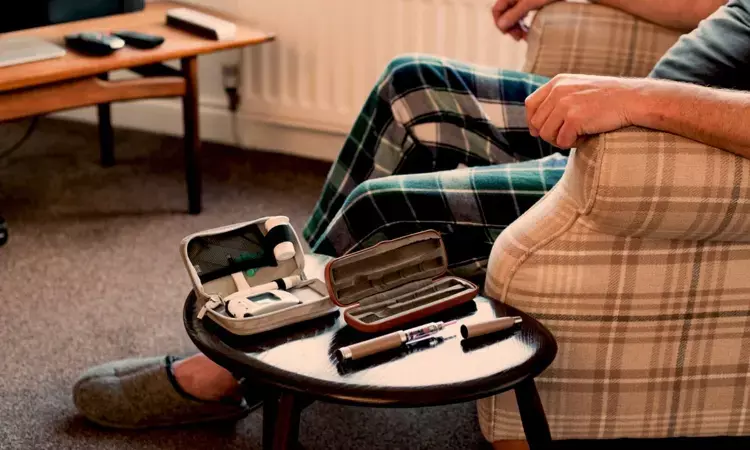- Home
- Medical news & Guidelines
- Anesthesiology
- Cardiology and CTVS
- Critical Care
- Dentistry
- Dermatology
- Diabetes and Endocrinology
- ENT
- Gastroenterology
- Medicine
- Nephrology
- Neurology
- Obstretics-Gynaecology
- Oncology
- Ophthalmology
- Orthopaedics
- Pediatrics-Neonatology
- Psychiatry
- Pulmonology
- Radiology
- Surgery
- Urology
- Laboratory Medicine
- Diet
- Nursing
- Paramedical
- Physiotherapy
- Health news
- Fact Check
- Bone Health Fact Check
- Brain Health Fact Check
- Cancer Related Fact Check
- Child Care Fact Check
- Dental and oral health fact check
- Diabetes and metabolic health fact check
- Diet and Nutrition Fact Check
- Eye and ENT Care Fact Check
- Fitness fact check
- Gut health fact check
- Heart health fact check
- Kidney health fact check
- Medical education fact check
- Men's health fact check
- Respiratory fact check
- Skin and hair care fact check
- Vaccine and Immunization fact check
- Women's health fact check
- AYUSH
- State News
- Andaman and Nicobar Islands
- Andhra Pradesh
- Arunachal Pradesh
- Assam
- Bihar
- Chandigarh
- Chattisgarh
- Dadra and Nagar Haveli
- Daman and Diu
- Delhi
- Goa
- Gujarat
- Haryana
- Himachal Pradesh
- Jammu & Kashmir
- Jharkhand
- Karnataka
- Kerala
- Ladakh
- Lakshadweep
- Madhya Pradesh
- Maharashtra
- Manipur
- Meghalaya
- Mizoram
- Nagaland
- Odisha
- Puducherry
- Punjab
- Rajasthan
- Sikkim
- Tamil Nadu
- Telangana
- Tripura
- Uttar Pradesh
- Uttrakhand
- West Bengal
- Medical Education
- Industry
Hypoglycemia induces inflammation among diabetes patients as well as non diabetics

Netherlands: Hypoglycemia induces a pro-inflammatory response that is sustained for one week in people with type 2 diabetes and in those without diabetes, says a recent study published in the journal Diabetes.
Iatrogenic hypoglycemia activates the immune system and is linked to an increased risk for atherosclerotic disease. The study was conducted by Clementine E.M. Verhulst, Department of Internal Medicine, Radboud University Medical Center, Nijmegen, The Netherlands, and colleagues with the objective to determine acute and long-term effects of insulin-induced hypoglycemia on inflammatory markers in humans with or without type 2 diabetes.
The study included fifteen adults with type 2 diabetes and 16 matched controls (M/F 17/14, age 59.6±7.1 years, BMI 28.5±4.3 kg/m2). They underwent a hyperinsulinemic-euglycemic (5.31±0.32 mmol/L) hypoglycemic (2.80±0.12 mmol/L) glucose clamp. Blood was drawn during euglycemia and hypoglycemia and 1, 3, and 7 days later to determine circulating immune cell composition, function, and inflammatory proteins.
The findings of the study were as follows:
- In response to hypoglycemia, absolute numbers of circulating lymphocytes and monocytes significantly increased and remained elevated for one week.
- The proportion of CD16+ -monocytes increased, and the proportion of CD14+ -monocytes decreased, which was sustained for a week in people without diabetes.
- During hypoglycemia, ex vivo stimulated, monocytes released more TNF-α and IL-1β, and less IL-10, particularly in people with diabetes.
- Hs-CRP and 25 circulating inflammatory proteins increased, remaining significantly elevated one week after hypoglycemia.
- While levels at euglycemia differed, responses to hypoglycemia were broadly similar in people with or without type 2 diabetes.
This led researchers to conclude, "that hypoglycemia induces a pro-inflammatory response at the cellular and protein level that is sustained for one week in people with type 2 diabetes and controls."
Reference:
Clementine E.M. Verhulst, Julia I.P. van Heck, Therese W. Fabricius, Rinke Stienstra, Steven Teerenstra, Rory J. McCrimmon, Cees J. Tack, Ulrik Pedersen-Bjergaard, Bastiaan E. de Galan; on behalf of the Hypo-RESOLVE consortium, Sustained Pro-Inflammatory Effects of Hypoglycemia in People with Type 2 Diabetes and in People Without Diabetes. Diabetes 2022; db220246. https://doi.org/10.2337/db22-0246
Dr Kamal Kant Kohli-MBBS, DTCD- a chest specialist with more than 30 years of practice and a flair for writing clinical articles, Dr Kamal Kant Kohli joined Medical Dialogues as a Chief Editor of Medical News. Besides writing articles, as an editor, he proofreads and verifies all the medical content published on Medical Dialogues including those coming from journals, studies,medical conferences,guidelines etc. Email: drkohli@medicaldialogues.in. Contact no. 011-43720751


